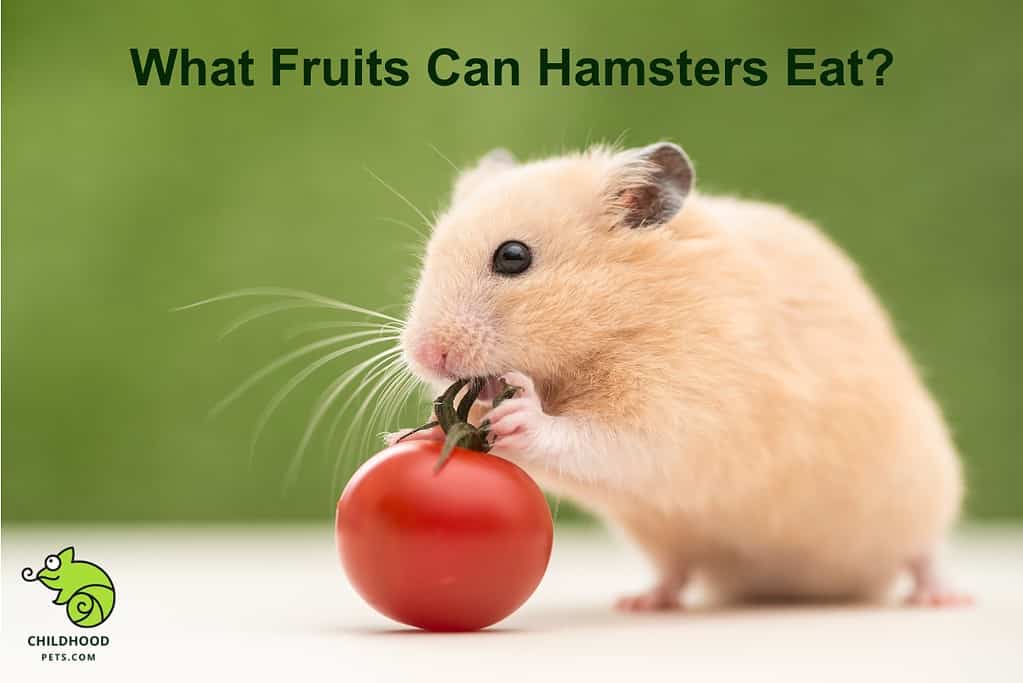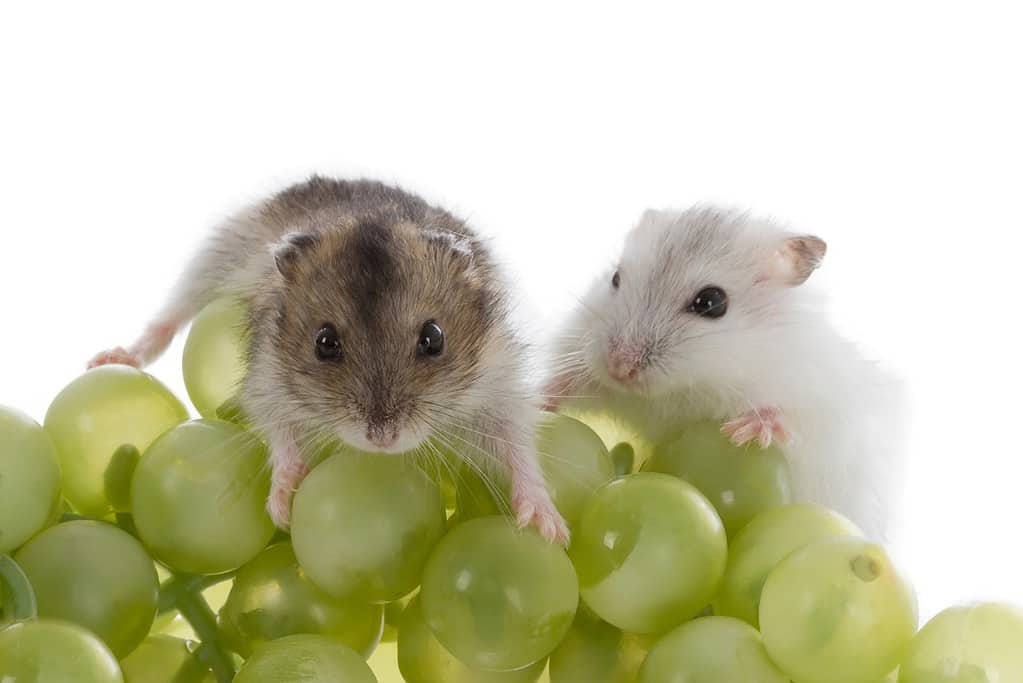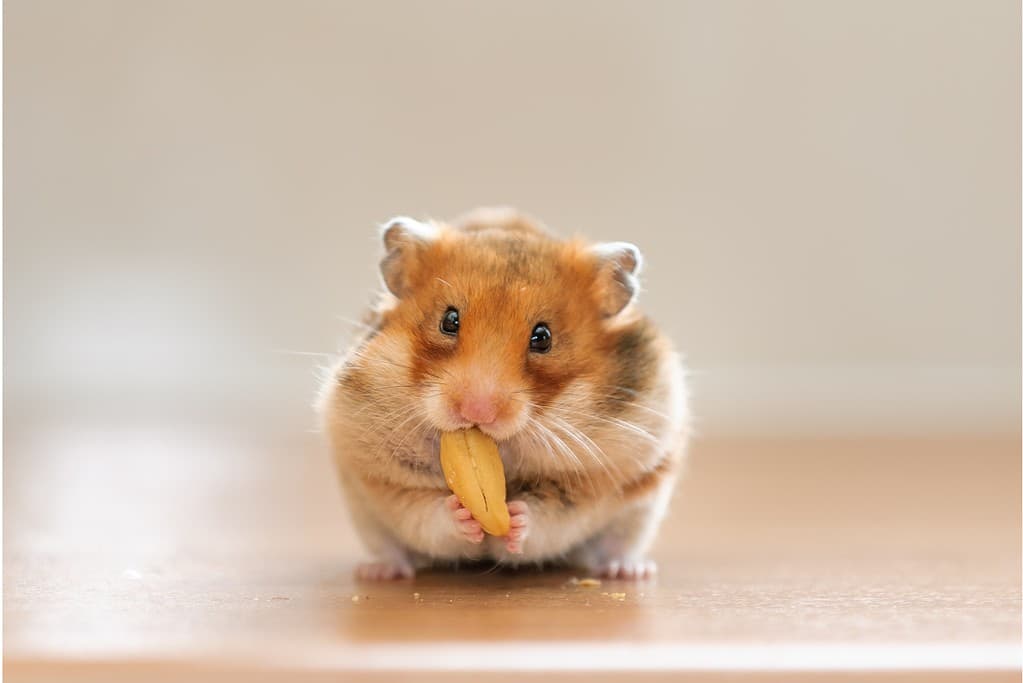
Hamsters are small, furry creatures that make great pets. They have unique dietary needs, so when it comes to feeding your hamster. It’s essential to know what types of food provide the best nutrition. Fruits can be a fun, healthy snack for your hamster, but you need to know what types of fruits are safe.
As a general rule, hamsters should only consume fresh fruits in moderation. Apples, bananas, grapes, melon, and some berries are suitable for consumption. However, citrus fruits like oranges, limes, lemons, and grapefruits should be avoided due to their high acid content.
In this article, we’ll look at the best types of fruit for your hamster and how much you should give them. With this knowledge, you can ensure your little friend gets all the nutrition they need.
Some Best Fruits For Hamsters To Eat
Hamsters are omnivores and can have fruits in their diet but only as treats. Not all types of fruits are suitable for hamsters. Fresh fruit is a delicious treat for hamsters, and only offer your hamster small pieces of fruit as an occasional snack.
However, it’s important to remember that hamsters should not be given too much fruit as it can cause serious health problems such as diabetes or obesity. Fruits should always be washed before feeding as they may contain pesticides or other contaminants.
Here are some best fruits for your pet hamster:
Apple
Apples are an excellent source of antioxidants and vitamin C. They are high in fiber, contain no cholesterol, and most hamsters can benefit from apples.
You should remove the core and seeds before feeding, as the seeds of apples contain cyanide, which is potentially toxic to hamsters. Grated, thinly sliced, or chopped apples can all be offered as treats.
Apples are high in sugar and can increase the risk of diabetes, mostly in Campbell’s Dwarf Hamsters, if given too often. Giving apples as a treat in moderation is considered a good option.
Pears
Pears are soft, crunchy, and delicious, making them an ideal snack for your hummies. They contain dietary antioxidants, Vitamin C, fibers, and Phytonutrients, all of which contribute to the overall health of your pet hamster.
Dietary fibers in pears are essential for maintaining digestive function in your hamster. This particular type of fiber helps relieve constipation and encourages healthy bowel movements. Vitamin C helps promote eye health and contributes to thick, shiny fur on your hamster’s body.
Antioxidants also help destroy free radicals, damaging cells, and other essential things. Overfeeding pears can cause diabetes, obesity, laziness, bone and joint pains, and other related issues.
Banana

Bananas contain essential nutrients like vitamin B6, vitamin C, copper, potassium, protein, magnesium, manganese, and fiber. All these nutrients are crucial to promoting good health for your hamster.
Bananas are packed with all essential vitamins and minerals that help fight off free radicals, infections, and diseases; maintain fur, skin, and eyes; prevent scurvy; support the immune system; boost digestion; and even fight cancer or tumor cells.
The glycemic index in bananas is moderate enough not to cause any drastic changes to your pet’s sugar levels.
Blueberries
Blueberries are an excellent snack for hamsters because they contain many essential nutrients. The vitamins C and K, potassium, and manganese found in blueberries can help promote healthy bone growth, digestion, and overall well-being for hamsters, as the Journal of AOAC International has shown that blueberries are more powerful antioxidant effects than most other fruits.
However, it’s important to remember that while blueberries benefit hamsters in moderate amounts, they also carry risks. Blueberries are acidic, which can cause digestive issues if consumed too often.
Kiwi
Kiwi is a delicious and nutritious snack treat option for hamsters and its sweet, juicy texture appeals to the taste buds of hamsters. The fiber in kiwi helps promote digestive regularity, preventing constipation or impaction in your hamster.
Kiwi also contains high levels of vitamin C and E (tocopherol), choline, lutein, and zeaxanthin which all help to fight against disease-causing free radicals.
Because of the high sugar content in kiwi, it’s not recommended for dwarf hamsters as it could lead to weight gain. Dwarf hamsters may have a paw-sized piece of kiwi once weekly as part of a balanced diet.
Grapes

Hamsters can benefit from eating grapes as they are the source of vitamins such as vitamins A, C, E, B1, B2, B6, and potassium, magnesium, calcium, iron, phosphorus, manganese, and zinc. Eating grapes can help hamsters maintain their fur health and energy levels.
When serving grapes to your hamster, giving small amounts and selecting dark grapes such as black grapes is best. Due to their higher levels of resveratrol, these grapes possess antioxidant properties that can reduce oxidative stress in your hamster’s body, slowing down the effects of aging.
Due to their high sugar content, grapes can cause weight gain, diabetes, and digestive problems in pet hamsters. To avoid these health issues, limiting offering grapes as a treat is important.
Melon
Melon is rich in essential vitamins, minerals, and fiber, and it can provide many benefits for improving hamsters’ health. The Vitamin C found in melon helps with collagen production, aiding in maintaining healthy skin and muscles.
Vitamin B6 helps to boost immunity, nervous system, and brain function, while potassium helps keep good blood pressure levels. Fibre aids digestion, allowing your furry friend to get the most out of their food intake. According to The Journal of Food Chemistry, the wild melon seed oil is very beneficial to modulates gut microbiota and for reducing plasma cholesterol in Hamsters.
Melons contain 92% water content which can cause diarrhea if overeaten. However, more melon can be consumed if a hamster is dehydrated.
Can Hamsters Eat Dried Fruit?

Hamsters can eat dried fruit as a special treat. However, it should only be given in small amounts, not as part of their regular diet.
It is higher in calories than fresh fruit because the drying removes the water, concentrating the sugar and calories into less volume. Freeze-dried fruit becomes sticky when exposed to water or liquid and can become stuck in your hamster’s cheek pouches.
Despite this, dried fruits still contain the same amount of vitamins, nutrients, and antioxidants as fresh fruits, but by weight, it has more fiber which helps keep a hamster’s digestive system regular. Therefore, dried fruits can make for a delicious snack with health benefits if given in moderation.
How Often Can Hamsters Have Fruit?
Fruits feeding depends on Hamster’s health and weight, they can have 1 to 2 servings of fruits. This should be fed besides with protein like plain-choked chicken or eggs and with veggies. Generally, hamsters should only be given a small piece of fruit (1-2 bite-sized chunks) once or twice a week. Please ensure the pieces are small enough that your hamster won’t choke on them.
Be careful when feeding fruits to young hamsters because their stomachs may not be able to handle the sugar content yet.
What Kind of Problems Are Caused by Feeding Citrus Fruit to Hamsters?
Feeding Citrus Fruits to hamsters can cause many health problems. Following are some health problems caused by excessive feeding of citrus fruits to hamsters.
Gastrointestinal Issues
Citrus fruits for hamsters can cause gastrointestinal issues such as diarrhea, stomach pain, and vomiting. Citrus fruits are highly acidic and contain a lot of sugar, which is difficult for hamsters to digest
Vitamin C Deficiency
Citrus fruit is a significant source of vitamin C. However, giving them to hamsters can lead to an imbalance in their diet. Hamsters do not require high levels of vitamin C in their diets due to their natural ability to produce the vitamin themselves internally. Overfeeding them can lead to a deficiency of other essential vitamins and nutrients necessary for their health.
Weight Gain
Feeding your hamster citrus fruits can also lead to unhealthy weight gain if overfed. This is because the sugar content in these fruits can cause a spike in blood sugar levels, leading to excess weight and associated health problems.
Kidney Damage
High levels of citric acid in citrus fruits can also be toxic and potentially damaging to the kidneys of hamsters over time. Symptoms such as frequent urination or drinking more water than usual may indicate kidney problems.
Tooth Decay
The citric acid in citrus fruits can erode the enamel on a hamster’s teeth, leading to dental problems. It is important to monitor your hamster’s teeth and ensure they are in good condition.
Final Thoughts
Hamsters can have fruit as a treat. These fruits provide essential vitamins and minerals that help improve health, energy levels, and digestion. It is necessary to regulate the amount of fruit you give your hamster and ensure a balanced diet. However, citrus fruits such as oranges or lemons should be avoided due to their high levels of citric acid, which can cause gastrointestinal issues, vitamin C deficiency, weight gain, kidney damage, and tooth decay if overfed.
Have you ever fed fruit to your hamster? If so, what kind of experience have you had with it? Let us know in the comments!
